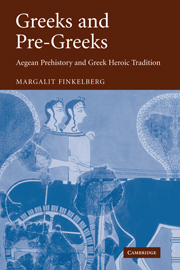Book contents
- Frontmatter
- Contents
- List of maps
- List of figures
- Preface
- List of abbreviations
- Chapter 1 Introduction
- Chapter 2 The heterogeneity of Greek genealogy
- Chapter 3 The pre-Hellenic substratum reconsidered
- Chapter 4 Kingship in Bronze Age Greece and Western Asia
- Chapter 5 Marriage and identity
- Chapter 6 The spread of the Greek language
- Chapter 7 The end of the Bronze Age
- Chapter 8 Continuities and discontinuities
- Appendix: The Testament of Hattusili
- List of references
- Index of passages cited
- General index
Chapter 8 - Continuities and discontinuities
Published online by Cambridge University Press: 22 September 2009
- Frontmatter
- Contents
- List of maps
- List of figures
- Preface
- List of abbreviations
- Chapter 1 Introduction
- Chapter 2 The heterogeneity of Greek genealogy
- Chapter 3 The pre-Hellenic substratum reconsidered
- Chapter 4 Kingship in Bronze Age Greece and Western Asia
- Chapter 5 Marriage and identity
- Chapter 6 The spread of the Greek language
- Chapter 7 The end of the Bronze Age
- Chapter 8 Continuities and discontinuities
- Appendix: The Testament of Hattusili
- List of references
- Index of passages cited
- General index
Summary
THE NEW BEGINNINGS
The period that followed the end of the Bronze Age (ca. 1050–ca. 800 bc) represented a sharp break from the Mycenaean civilisation and was characterised by deep recession in material culture. It is true that archaeological discoveries of the last decades, first and foremost the famous Lefkandi tomb, have shown that there were pockets of continuity even in the so-called Dark Age. Yet, this evidence, indicative as it is of the complex mixture of continuities and discontinuities that characterised the transition to the Iron Age, cannot affect the general assessment of the relationship between Dark Age Greece and its Mycenaean predecessor, let alone account for the contrast with the epoch subsequent to it. The growth of population and a considerable increase in prosperity, which are discernible in the archaeological record since the early eighth century bc, fully justify singling out the Dark Age as a separate historical period. This is not yet to say that recession in material culture was the only feature by which the Dark Age was characterised.
Let us consider an additional version of the destruction of the Race of Heroes, the one found in the concluding part of the Catalogue of Women. This corrupted passage, which immediately follows the description of Helen's wedding, runs as follows:
And all the gods were split over the strife. For this was the time when Zeus high-thundering contrived wondrous deeds, to stir up and mix {…] over the boundless earth, and he was already most eager to wipe out the race of mortal men, and declared that he would destroy the lives of the demigods […}, that the children of gods [should not mix] with wretched mortals, seeing […] with his own eyes, but that the blessed [gods] should keep their own company and lead their lives apart from men even as before. And so Zeus [inflicted] suffering upon suffering on those who [were born] of immortals and of mortal men.
- Type
- Chapter
- Information
- Greeks and Pre-GreeksAegean Prehistory and Greek Heroic Tradition, pp. 161 - 176Publisher: Cambridge University PressPrint publication year: 2006



